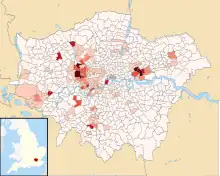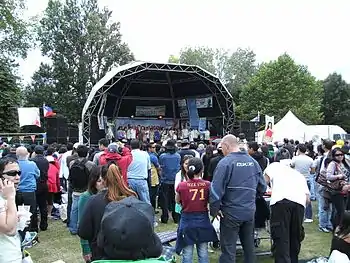Filipinos in the United Kingdom
Filipinos in the United Kingdom are British citizens or immigrants who are of Filipino ancestry.
 Distribution by regional area. | |
| Total population | |
|---|---|
| Filipino-born residents 129,836 (2011 Census) 132,000 (2015 ONS estimate) Filipinos regardless of birthplace 200,000 (2007 estimate) | |
| Regions with significant populations | |
| London, English Midlands, North West England, South East England | |
| Languages | |
| British English, Philippine English, Filipino (Tagalog, Philippine languages) | |
| Religion | |
| Predominantly Roman Catholicism Irreligion · Protestantism · Islam · Buddhism · | |
| Related ethnic groups | |
| Filipino people, Overseas Filipinos |
| Part of a series on |
| British people |
|---|
| United Kingdom |
| Eastern European |
| Northern European |
| Southern European |
| Western European |
| Central Asian |
| East Asian |
| South Asian |
| Southeast Asian |
| West Asian |
| African and Afro-Caribbean |
| Northern American |
| Latin American |
Demographics
Population


The 2001 UK Census recorded 40,118 people born in the Philippines.[1] The 2011 census recorded 117,457 people born in the Philippines resident in England, 5,168 in Wales,[2] 4,264 in Scotland[3] and 2,947 in Northern Ireland,[4] making a total of 129,836. The Office for National Statistics estimates that, in 2015, the equivalent figure was 132,000.[5]
According to The Manila Times, there were approximately 200,000 Filipinos living in the United Kingdom in 2007.[6] In 2007, 10,840 Filipinos gained British citizenship, the second largest number of any nation after India,[7] compared to only 1,385 in 2001.[8]
Distribution
The largest Filipino community in the United Kingdom is in and around London, based around Earl's Court. Filipinos also account for the largest foreign-born population in the London Borough of Sutton.[9] Other towns and cities with significant Filipino communities include Birmingham, Liverpool, Manchester, Bristol, Leeds, Southampton, Worthing, Gloucester[10] and Barrow-in-Furness, which is home to a sizeable flourishing Filipino community.[11] Fiestas are held during June July and August in various cities throughout the UK. London Barrio Fiesta sa Hounslow Central Born 2023 always be held June- 2023 , Philippines Independence day 2024 ,
Economics
According to the Institute for Public Policy Research, 85.4 per cent of new immigrant Filipinos to the UK of working age are employed (as opposed to inactive - a category which includes students - or unemployed), with 12.8% being low earners (people making less than £149.20 a week – half the UK median wage) and 0.61 per cent are high earners (people earning more than £750 a week). 78% of settled Filipino immigrants to the UK are employed, with 15.4% being low earners and 1.28 per cent being high earners.[12] In 2020, 18,500 Filipinos were employed by the National Health Service;[13] as of April 2020, of NHS workers who have died of COVID-19, 20% were Filipino.[14]
Culture and community
Community groups
Filipino community groups in the UK include:
- Aguman Kapampangan United Kingdom was founded in 1994 March 14,
- Kanlungan, a registered charity which is a consortium of grassroots community organisations working closely together for the welfare and interests of migrants, refugees, diaspora communities from the Philippines and Southeast Asia living in the UK.[15]
- The Centre for Filipinos, a Filipino advocacy and outreach charity;[16]
- Lahing Kayumanggi dance company focusing on traditional Filipino dance;[17]
- EA Doce Pares, an Eskrima/Arnis school promoting and educating the community on the Philippine warrior arts and culture;[18]
- Phil-UK, a group for young and second-generation Filipinos in the UK;[19]
- Philippine Generations, a Second Generation led not for profit Organisation promoting the Philippines, its people and culture in the UK;[20]
- The Philippine Centre, a charity promoting culture and community spirit.[21]
- One Filipino is a group supporting local Filipino organisations in the United Kingdom and also to promote the campaign towards good governance and Filipino empowerment.[22]
- Filipino Leeds Community,[23] or FLC, formerly called Filipino Leeds Association (FLA), a non-profit organisation based in Leeds, West Yorkshire, composed of Filipino and British-Filipino volunteers dedicated to promote the uniqueness of the Filipino culture to the British society. The association has been supporting Filipinos in Leeds on immigration, housing and financial issues. Launched on 24 December 2010, FLA organized funding raising events and activities, such as the Leeds Barrio Fiestas, Filipino sports festivals and get-together parties, all supporting local and Philippine charities.[24]
- Filipino Women's Association UK (FWA UK), a not for profit, charitable organisation providing support to vulnerable women and children in the Philippines.[25]
- Handog Natin Charity UK, a Coventry-based registered charity organisation conducting mission projects in the Philippines for disaster relief, medical, educational and livelihood programs. It also serves as a communication hub for Filipinos living and working in Coventry and surrounding areas.
The 'Barrio Fiesta sa London', a two-day annual festival formerly held in Lampton Park, Hounslow, West London, is perhaps the best known and largest gathering for the community in the UK, which was launched in 1985. Since then, smaller versions of the festival have been held at various locations across the UK, with the original festival receiving well over 30,000 visitors in a single day. It is organised and run by The Philippine Centre but draws Filipino community groups and businesses from all over the UK. The Barrio Fiesta sa London moved location in 2013 and is now held in Apps Court Farm, Walton-on-Thames.
Notable individuals
References
- "Country-of-birth database". Organisation for Economic Co-operation and Development. Archived from the original on May 11, 2005. Retrieved 2008-11-03.
- "2011 Census: Country of birth (expanded), regions in England and Wales". Office for National Statistics. 26 March 2013. Retrieved 15 February 2017.
- "Country of birth (detailed)" (PDF). National Records of Scotland. Retrieved 15 February 2017.
- "Country of Birth – Full Detail: QS206NI". Northern Ireland Statistics and Research Agency. Retrieved 15 February 2017.
- "Table 1.3: Overseas-born population in the United Kingdom, excluding some residents in communal establishments, by sex, by country of birth, January 2015 to December 2015". Office for National Statistics. 25 August 2016. Retrieved 15 February 2017. Figure given is the central estimate. See the source for 95% confidence intervals.
- "Filipino baby boom in the United Kingdom". Manila Times. 2007-09-24. Archived from the original on December 7, 2008. Retrieved 2009-02-22.
- Freelove Mensah, John (2008-05-20). "Persons granted British citizenship, United Kingdom, 2007" (PDF). Home Office Statistical Bulletin. Home Office. 05/08: 20. Archived from the original (PDF) on 2009-11-22. Retrieved 2009-02-22.
- Dudley, Jill; Hesketh, Krystina (2002-06-02). "Persons granted British citizenship, United Kingdom, 2001" (PDF). Home Office Statistical Bulletin. Home Office. 06/02: 16. Archived from the original (PDF) on July 12, 2007. Retrieved 2009-02-22.
- "MAP: The Largest Migrant Population in Each Borough of London". Business Insider.
- "Population of the UK by country of birth and nationality: individual country data". Office for National Statistics. 23 May 2019. Retrieved 22 November 2019.
- Reuben Abraham (2 February 2007). "Filipinos flourish in Barrow". BBC. Retrieved 2007-12-06.
- "How different immigrant groups perform". Born Abroad. BBC. 2005-09-07. Retrieved 2009-02-22.
- Quinn, Ben (17 April 2020). "Coronavirus exerts heavy toll on Filipino community in UK". The Guardian. Retrieved 13 June 2020.
- James Clayton (1 May 2020). Why are so many Filipino health workers dying of Covid19? - BBC Newsnight. BBC News Night. Archived from the original on 2021-12-14. Retrieved 13 June 2020.
- https://www.kanlungan.org.uk/
- "Centreforfilipinos.org". Archived from the original on 2018-08-09. Retrieved 2018-09-20.
- "LK Dance Company". Archived from the original on 2009-02-14. Retrieved 2009-09-23.
- "EA Doce Pares - London UK - Eskrima Kali Arnis FMA". Eadocepares.com. Retrieved 10 January 2018.
- "Phil-UK – Filipino Community in the UK". Phil-uk.com. Retrieved 10 January 2018.
- "Philippine Generations". Philippine Generations. Retrieved 10 January 2018.
- "Philippine Centre". Philippinecentre.com. Retrieved 10 January 2018.
- "One Filipino". Archived from the original on 2011-02-19. Retrieved 2018-09-20.
- "FLC". Archived from the original on 2016-02-08. Retrieved 2016-01-11.
- "Residents encouraged to support events in aid of typhoon victims". News.leeds.gov.uk. Retrieved 10 January 2018.
- "Filipino women's association uk – FWA – UK Charity". Fwa-uk.com. Retrieved 10 January 2018.
External links
- Kanlungan Kanlungan is a registered charity which is a consortium of grassroots community organisations working closely together for the welfare and interests of migrants, refugees, diaspora communities from the Philippines and Southeast Asia living in the UK.
- Phil-UK, a website for young Filipinos living in the UK
- Philippine Centre, a UK Charity providing advice & support to UK Filipinos
- Philippine Embassy Philippine Embassy in the UK
- Filipinos in Barrow-in-Furness
- One Pinoy Masons UK - The Official Group of Filipino Masons in the United Kingdom
